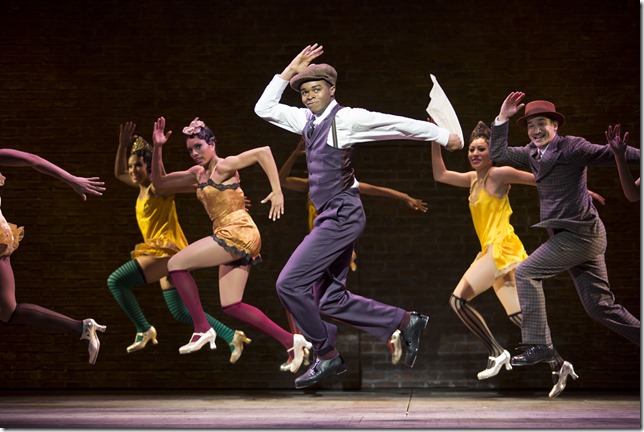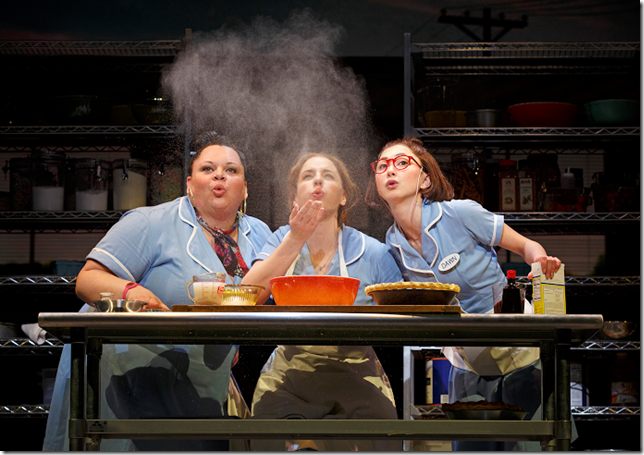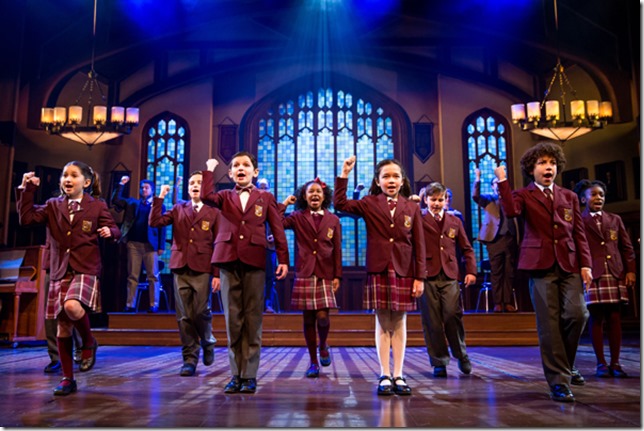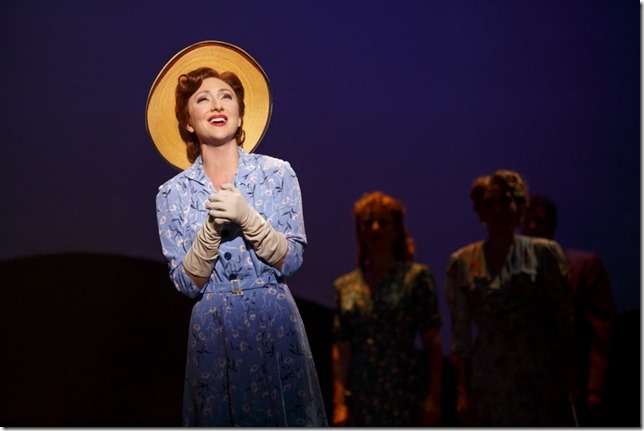The cast of Shuffle Along performs “Broadway Blues.” (Photo by Julieta Cervantes)
The only suspense at this year’s Tony Awards was over whether Hamilton would set a new record for winning the most statuettes. (It fell short of The Producers’ 12-Tony total by one.) Still, it has sucked most of the air out of the Broadway season, so here is a look at some of the also-rans:
Shuffle Along: Does anyone other than a theater historian remember Shuffle Along, a hit show from 1921 that featured a largely forgotten score by Eubie Blake and Noble Sissle and, more significantly, an all-black cast, writing team and producers?
It hardly seemed like likely fodder for revival today, but leave it to director/adapter George C. Wolfe to see the show’s landmark significance and racial ironies, points of interest for a contemporary Broadway audience. Of course, you could read the proverbial phone book if you have a cast headed by Brian Stokes Mitchell, Audra McDonald and Billy Porter — all Tony winners — and jaw-dropping tap choreography by Savion Glover. (After the show opened in late April, six-time Tony winner McDonald announced that she was pregnant and would be shuffling along in July. Producer Scott Rudin said last week the show would close July 24.)
What Wolfe and Glover hath wrought is hardly a revival, but more of a backstage/onstage history of Shuffle Along, as the new subtitle — Or the Making of the Musical Sensation of 1921 and All That Followed — suggests. Cleverly, this allows them to avoid most of the flimsy plot of the original show, something about a small-town mayoral campaign, and showcase lots of flashy dance steps before turning dark in the second act with a downbeat summary of the cast’s fate after their hit show closed.
Getting the show to New York is not easy either, as its producers, writers and featured players — F. E. Miller (Mitchell) and Aubrey Lyles (Porter) — learn, running into financial and racial hurdles. But they persevere and are acclaimed, along with their triple threat star, Lottie Gee (McDonald; who knew she could tap, too?), singing musical numbers like “I’m Just Wild About Harry,” by the songwriting team of Sissle (Joshua Henry) and Blake (Brandon Victor Dixon). Somehow, perhaps it is the show’s vintage material and up-to-the-minute message, Wolfe managed to woo most of Broadway’s African-American talent to this project.
Shuffle Along is marred by the schizophrenic nature of its narrative. The first act is relatively conventional with its putting-on-a-show plot, while the second act is largely a coda, a post-Shuffle account of the cast and creative team’s woes. The revision of the show’s second half in previews was much reported, and frankly the final result still feels one draft away from being satisfying.
Still, Shuffle Along, Or etc. scores points for effort and audacity and for its knockout performances.
SHUFFLE ALONG, OR THE MAKING OF THE MUSICAL SENSATION OF 1921 AND ALL THAT FOLLOWED, Music Box Theatre, 239 W. 45th St. $69-$169. Closes July 24.
* * *
Keala Settle, Jessie Mueller and Kimiko Glenn in Waitress.
Waitress: Let’s hear it for the girls. Besides being an audience-friendly, mainstream musical with a likely lucrative life ahead of it, Waitress is notable for coming from an all-female creative team and a substantially female cast. Based on the 2007 chick flick about a diner server and pie baker stuck in a loveless, abusive marriage, it makes the transition to the musical stage with seemingly little effort, thanks to the steady, if conventional, guidance of director Diane Paulus (Hair, Pippin, Finding Neverland) and the Broadway debut of composer-lyricist Sara Bareilles. And while one can envision many performers in the central role of poor, put-upon Jenna, the show gets a distinct boost from the casting of Jessie Mueller, 2014 Tony winner for Beautiful: The Carole King Musical.
If the script by Jessie Nelson does not seem to be a major contributor to the show, that could be because it strays so little from the screenplay by the late Adrienne Shelley. Jenna is one of a threesome of waitresses at Joe’s Pie Diner, with feisty Keala Settle and meek Kimiko Glenn as her standard-issue, but endearing sitcom sidekicks. Jenna’s life gets complicated real fast when she finds herself pregnant by her lunkhead hubby Earl (Nick Cordero), goes to her Southern town’s newly arrived gynecologist (Drew Gehling), and finds herself romantically drawn to him.
Presumably under Paulus’s tutelage, Bareilles’ first foray into musical theater is remarkably assured, surely the best pop-to-stage debut since Cyndi Lauper got Kinky Boots hitting its stride. She writes for character and knows how to unleash a power ballad, as Mueller’s 11 o’clock number, “She Used to Be Mine,” attests. If she wanted a life in the theater, she could make a substantial contribution to it.
The women rule in Waitress, but Gehling’s wry presence is a genuine asset and Christopher Fitzgerald is a certified scene stealer as goofy Ogie, who sweeps Glenn off her reticent feet. Designer Scott Pask gets the audience in the right mood from the start with a lattice cherry pie show curtain, flanked by two revolving glass towers of pies. And yes, that is the aroma of baking goods wafting throughout the Brooks Atkinson Theatre. Some enterprising pastry chef could make a killing opening a pie shop nearby.
WAITRESS, Brooks Atkinson Theatre, 256 W. 47th St. $79-$169.
* * *
The children’s ensemble in School of Rock.
School of Rock: W.C. Fields was right to recoil from working with children or animals, and the kids of School of Rock are exactly the scene-stealing tykes that he most dreaded. Adorable and wickedly talented on musical instruments, they are the reason to see the unnecessary stage adaptation of that 2003 Jack Black movie comedy about a gaggle of prep school tots who connect with their inner rock star, thanks to an anarchic dude who fakes his way into becoming their substitute teacher and pied piper.
If you saw the film, there are few surprises for you in the pleasant, but unexceptional musical version, penned by such unlikely suspects as book writer Julian Fellowes (Downton Abbey) and Andrew Lloyd Webber (Phantom of the Opera). Fellowes adds a few new jokes to the ultimately sentimental tale and Webber shows he knows his way around heavy metal. What drew them to the show is hard to fathom, but it should manage to make them both quite rich, not that either needs the money.
Director Laurence Connor (of the Les Misérables revival) has the services of a wild man named Alex Brightman who does a fine job of channeling Black’s movie performance as loose cannon Dewey Finn. It is not his fault that the kids manage to outshine him. The same goes for the golden-throated Sierra Boggess as the school’s uptight principal, who cannot figure out what to make of Dewey.
All the parents of these kids want is for them to toe the line and not question their futures as lawyers and hedge fund managers. They are ripe for rebellion when Dewey gives them a way to be heard, with full amplification. Webber reaches back to his Jesus Christ Superstar days with a bass-heavy, badass score, made all the more appealing coming from these pint-sized rockers. Among the standouts are Brandon Niederauer as a guitar virtuoso, adorable Evie Dolan on bass and late bloomer Bobbi MacKenzie as lead vocalist.
The very accessible School of Rock is bound to be around for a long time to come, providing child labor for scores of underage rockers.
SCHOOL OF ROCK, Winter Garden Theatre, 1634 Broadway. $79-$145.
* * *
Carmen Cusack in Bright Star. (Photo by Joan Marcus)
Bright Star: Bluegrass music is not inherently theatrical, and little of the score to Bright Star — written by the attention-getting duo of Steve Martin and Edie Brickell — leaves much of an impression, in support of a whimsical, far-fetched folk tale about a lost infant, allegedly based on a true story.
Director Walter Bobbie (best known for the substantially more edgy Chicago) sets the action inside a backwoods cabin where the countrified band accompanies the unraveling tall tale. It shifts about in time, opening in 1945, where Billy Cane, a young soldier is returning from war to his hometown in North Carolina, is determined to become a writer. He takes some of his stories to the Asheville newspaper, where renowned literary agent and spinster Alice Murphy (the entrancing Carmen Cusack, making her Broadway debut) gives Billy some encouragement.
The show then flashes back to Alice’s teen years, when the coltish, headstrong lass becomes involved with the mayor’s son and is soon pregnant. The mayor quashes their marriage plans, and goes so far as to take the baby away from Alice and put it up for adoption. Dickensian coincidences follow, which you may swallow or not, on the way to a musical comedy happy ending complete with reunion and redemption. Book writer Martin shows storytelling skill, as the narrative moves about in time with clarity, but the heart-on-its-sleeve, please-take-this-yarn-seriously tone feels strained.
Keeping our interest beyond the plot potholes is Cusack, who shifts chameleon-like between young and old Alice and sings with soaring sincerity. There are plenty of Broadway veterans in support — Stephen Bogardus, Dee Hoty, Michael Mulheren — but they largely get lost in the ensemble.
Bright Star is a pleasant enough way to spend an evening out, but with spiraling ticket prices and their accompanying expectations, you have to wonder whether “pleasant” is sufficient. Martin and Brickell reportedly covered the weekly box office deficits to keep the show open, at least until the Tony Awards.
And indeed, its future beyond that didn’t look bright: The show closed Sunday.



